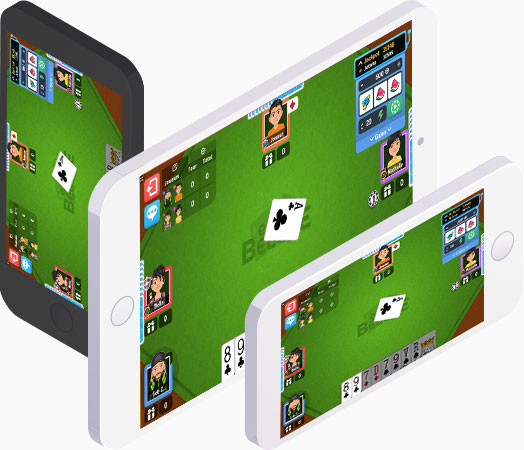Jeu de Belote en ligne
La plus ancienne communauté de belote multijoueur en ligne !
PRESENTATION
Jeu de Belote et de Coinche
La belote classique et la coinche sont des jeux familiaux et conviviaux qui se jouent à 4 personnes, par équipes de 2 joueurs. Il vous faudra utiliser un jeu de 32 cartes. En famille, entre amis ou en tournois chaque joueur aimant les jeux de cartes y trouvera son compte.
Exoty vous propose en une seule application un jeu de cartes de belote classique et de coinche qui satisfera le plus grand nombre. Que ce soit une partie de belote ou de coinche pour passer le temps ou pour participer à un tournois et vous confronter aux meilleurs joueurs.
Exoty belote en ligne vous offre gratuitement des jeux en ligne que vous pouvez télécharger sur votre téléphone Android ou iOs. Vous pouvez aussi jouer sur votre ordinateur sans avoir à télécharger aucun logiciel.
LE JEU
Images du jeu
En mode compétition !
C’est le mode de jeu préféré de la communauté Exoty. Le mode Arena ne s’arrête jamais, vous pouvez rejoindre à tout moment un tournoi de coinche ou de belote en ligne. Les règles sont simple : enchaîner le maximum de victoires pour décrocher le jackpot.
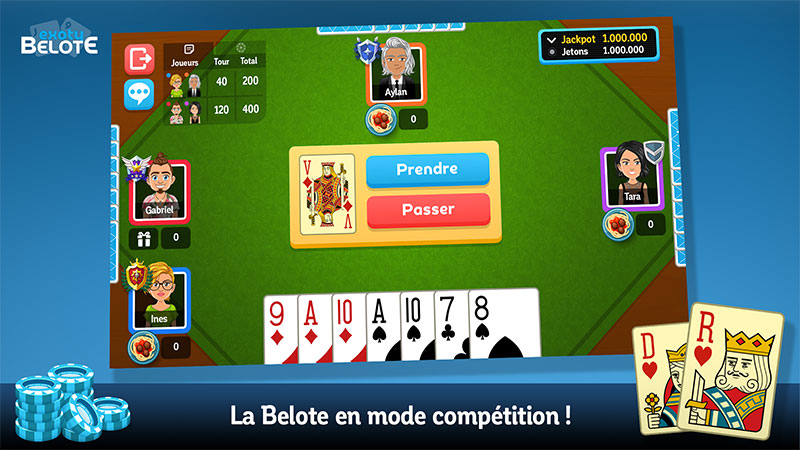
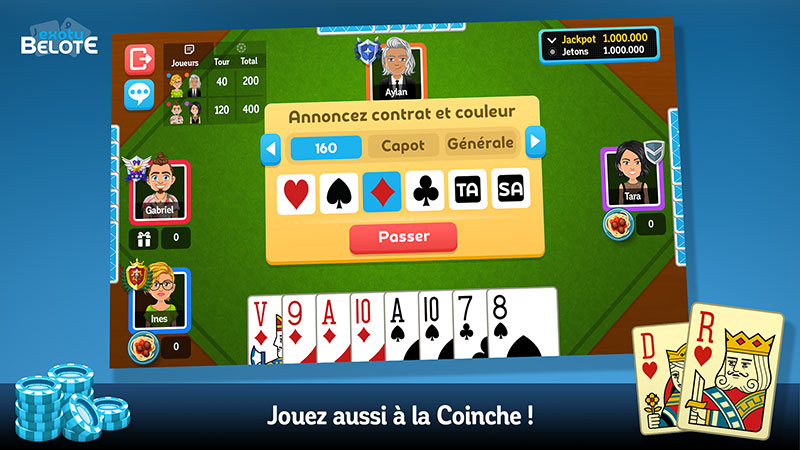
Jouer aussi à la coinche !
La belote classique est la variante la plus populaire, ce sont les bases de la belote, le passage obligé pour chaque joueur. Mais dans le cœur de chaque joueur c’est la coinche qui remporte tous les suffrages.
Plusieurs niveaux de jeu !
Selon que vous soyez débutant, intermédiaire ou niveau avancé au jeu de belote classique ou coinche, il existe une table pour chacun des niveaux ! Rendez-vous sur les petites tables pour jouer à la belote avec des joueurs de votre niveau ou sur les grosses tables pour faire progresser votre niveau.
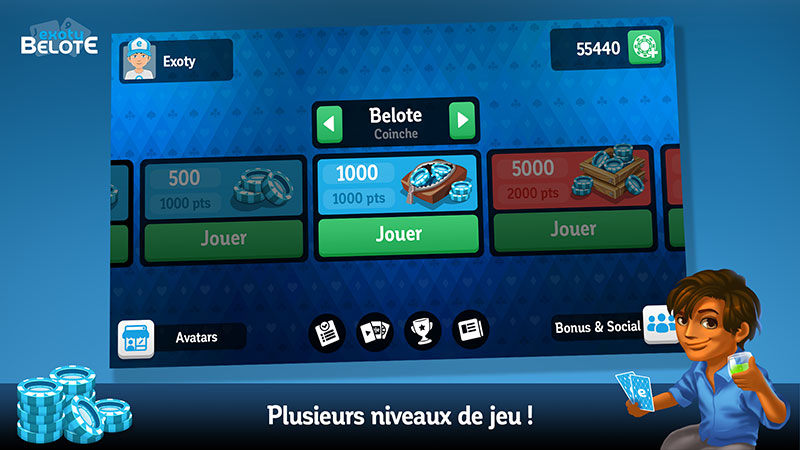
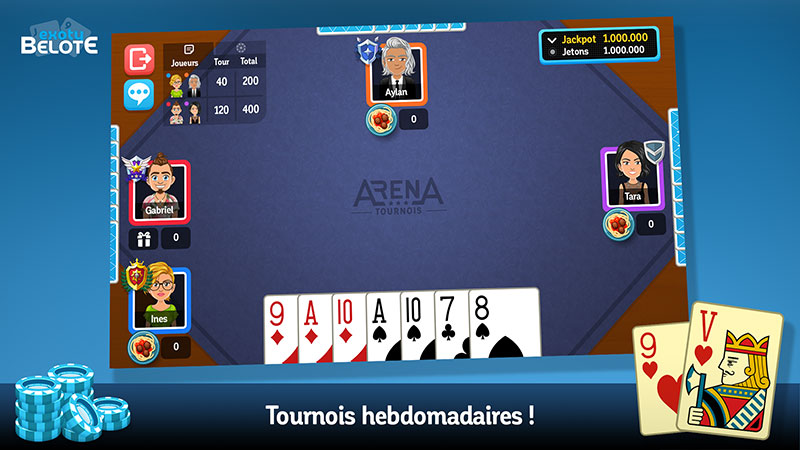
Tournois hebdomadaires !
Jouer à la belote en participant à un tournoi de type Arena pour la belote en ligne ou de coinche, c’est possible ! Le but est de gagner jusqu’à 10 parties de belote ou de coinche d’affilées pour remporter le jackpot ! Plusieurs paliers de sorties sont également disponibles.
Progressez dans les ligues !
Quel est votre véritable niveau de joueur de belote classique ? Et bien grâce aux ligues vous allez pouvoir le démontrer ! Chaque semaine participez aux ligues Exoty et atteignez la division supérieure pour devenir le meilleur joueur de belote !
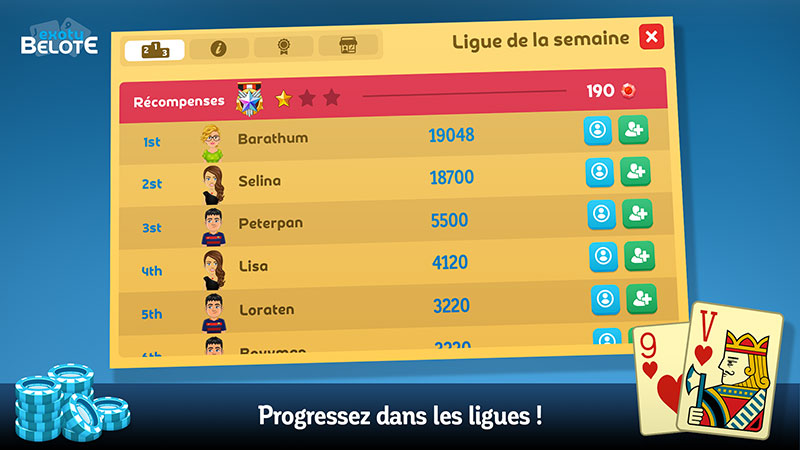
Présentation du jeu :
Univers compétitif :
Exoty belote est un jeu en ligne mais aussi un véritable lieu de compétition où vous affronterez d’autres joueurs en ligne en tournois, en ligues ou défis. Grâce au classement des ligues, classez-vous dans l’une des 5 ligues de 3 niveaux.
Lieu de rencontre :
L’application de belote et Coinche en ligne est aussi un lieu pour faire des rencontres basées sur le même principe d’affinités ! En effet, nombreux joueurs de France ou de votre région partagent ce même centre d’intérêt, quoi de mieux pour amorcer une discussion ?
Fonctionnalités pratiques :
Grâce à la boutique avatar, personnalisez votre personnage de jeu selon l’envie du moment ou la festivité. Durant une partie, envoyez des petites surprises comme un cocktail ou une pâtisserie qui ravira les autres joueurs de la partie de cartes !
Des bonus gratuits :
Vous pouvez jouer à la belote ou à la coinche gratuitement en profitant des différents bonus du jeu. Bonus vidéo, cadeaux des amis ou machines à jetons, jeux Facebook, autant de possibilités de joueur sans payer! Avis aux petits malins qui veulent jouer sans compromis!
Des miliers de joueurs :
Jouez à la belote avec tous les joueurs francophone venant de l’hexagone ou de la Belgique, de la Suisse, du Canada et même du reste du monde. La communauté des joueurs est tellement grande qu’il y aura des joueurs à toutes heures !
D’autres jeux :
Exoty ce n’est pas qu’un jeu en ligne de Belote ou de Coinche, c’est aussi un jeu de Tarot. Si vous êtes un joueur de Belote vous serez certainement familier avec le tarot, pourquoi ne pas tentez l’aventure ?



